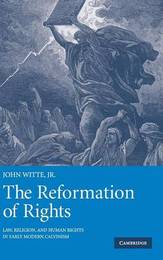
|
The Reformation of Rights: Law, Religion and Human Rights in Early Modern Calvinism
Hardback
Main Details
| Title |
The Reformation of Rights: Law, Religion and Human Rights in Early Modern Calvinism
|
| Authors and Contributors |
By (author) John Witte, Jr
|
| Physical Properties |
| Format:Hardback | | Pages:406 | | Dimensions(mm): Height 229,Width 24 |
|
| Category/Genre | Christian theology |
|---|
| ISBN/Barcode |
9780521818421
|
| Classifications | Dewey:261.7094 |
|---|
| Audience | | Professional & Vocational | |
|---|
| Illustrations |
1 Halftones, unspecified; 6 Line drawings, unspecified
|
|
Publishing Details |
| Publisher |
Cambridge University Press
|
| Imprint |
Cambridge University Press
|
| Publication Date |
3 January 2008 |
| Publication Country |
United Kingdom
|
Description
John Calvin developed arresting new teachings on rights and liberties, church and state, and religion and politics that shaped the law of Protestant lands. Calvin's original teachings were periodically challenged by major crises - the French Wars of Religion, Dutch Revolt, the English Civil War, American colonization, and American Revolution. In each such crisis moment, a major Calvinist figure emerged - Theodore Beza, Johannes Althusius, John Milton, John Winthrop, John Adams, and others - who modernized Calvin's teachings and translated them into dramatic new legal and political reforms. This rendered early modern Calvinism one of the driving engines of Western constitutionalism. A number of basic Western laws on religious and political rights, social and confessional pluralism, federalism and constitutionalism, and more owe a great deal to this religious movement. This book is essential reading for scholars and students of history, law, religion, politics, ethics, human rights, and the Protestant Reformation.
Author Biography
John Witte, Jr. is Jonas Robitscher Professor of Law and Director of the Center for the Study of Law and Religion at Emory University. His many publications include Law and Protestantism (2002).
Reviews'Historians, not to mention philosophers and theologians, have too long overlooked the Calvinist contribution to the human rights tradition. John Witte's superlative study definitively corrects that shortcoming and thereby makes an indispensable contribution to our changing understanding of that tradition.' Professor David Little, T. J. Dermot Dunphy Visiting Professor of the Practice in Religion, Ethnicity, and International Conflict, Harvard Divinity School 'John Witte has written a magistral survey of ideas about law, religion and human rights as developed by John Calvin in sixteenth-century Geneva and then developed and adapted by selected intellectual descendants of his in France, the Netherlands, England, and colonial America. These ideas are analyzed with all the clarity and bite one expects of a great historian of thought. They should make a useful and thought-provoking contribution to modern attempts to cope with concepts that are still of fundamental importance.' Robert M. Kingdon, Professor Emeritus, University of Wisconsin-Madison 'The Reformation of Rights will come as a revelatory jolt to those who embrace the standard history of natural rights, which holds that the idea of such rights was introduced into Western thought by the political philosophers of the Enlightenment. Witte's argument, developed with meticulous attention to the sources, and always judicious in its conclusions, is that centuries before the Enlightenment, Calvinists were arguing for natural rights, especially natural religious rights: freedom of conscience, freedom of exercise, freedom of the church. The Reformation of Rights is a magisterial contribution to a new narrative of rights.' Nicholas Wolterstorff, Noah Porter Professor Emeritus of Philosophical Theology, Yale University
|